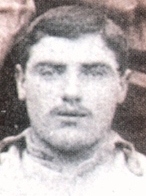Thomas Bradshaw (footballer born 1873)
 |
|||
| Personal information | |||
|---|---|---|---|
| Full name | Henry Thomas Bradshaw | ||
| Date of birth | 24 August 1873 | ||
| Place of birth | Liverpool, England | ||
| Date of death | 25 December 1899 (aged 26) | ||
| Place of death | Tottenham, London, England | ||
| Playing position | Forward | ||
| Youth career | |||
| 1889–1891 | Liverpool Nomads | ||
| Senior career* | |||
| Years | Team | Apps | (Gls) |
| 1891–1893 | Northwich Victoria | ||
| 1893–1898 | Liverpool | 118 | (45) |
| 1898 | Northwich Victoria | ||
| 1898–1899 | Tottenham Hotspur | ||
| 1899 | Thames Ironworks | 5 | (0) |
| National team | |||
| 1897 | England | 1 | (0) |
| * Senior club appearances and goals counted for the domestic league only. |
|||
Henry Thomas "Harry" Bradshaw (24 August 1873 – 25 December 1899) was an English international footballer who played in the outside-left and centre-forward positions for Liverpool, Northwich Victoria, Tottenham Hotspur and Thames Ironworks during the late 19th century.
Bradshaw was born in Liverpool, Merseyside and was signed for Liverpool from Northwich Victoria in October 1893 by manager John McKenna. Originally playing as a centre-forward, Bradshaw made his debut against Woolwich Arsenal, in a Football League Division Two game, scoring the last goal in a 5–0 victory. He went on to score seven in the remaining fourteen matches of the 1893–94 season, helping Liverpool to the Second Division title and promotion to the top tier of English football, after a Test Match victory over Newton Heath.
During the following season Bradshaw was the only ever-present and scored seventeen times, in a Liverpool team that struggled and were eventually relegated back down to Division 2. Liverpool again topped the Second Division at the end of the 1895–96 season with Bradshaw scoring twelve goals from his new position on the left-wing, his versatility giving Liverpool an extra dimension to their attack.
Bradshaw gained one England cap when he played against Ireland on 20 February 1897 and holds the distinction of being Liverpool's first ever player to achieve International recognition.
...
Wikipedia
